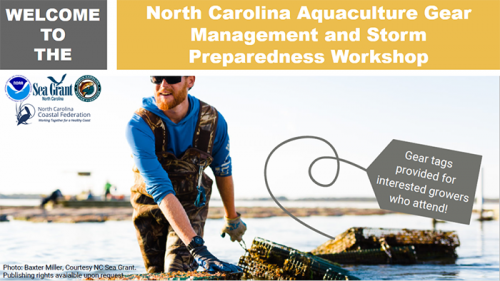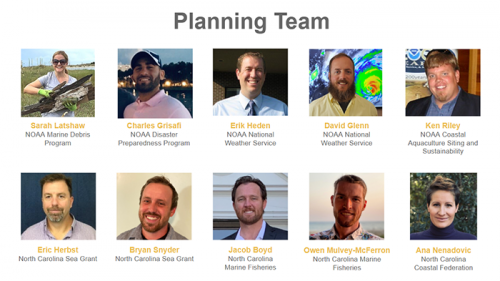Aquaculture Debris Prevention and Storm Preparedness in North Carolina
April 12, 2021 — Aquaculture, or the farming of aquatic animals like oysters, is becoming more and more popular in coastal areas. As the demand for seafood rises around the world, aquaculture provides a sustainable way to meet that demand.
In North Carolina, this industry has grown quickly, with the state seeing about ten times the shellfish lease applications from 2012 to 2019, and more $USD value than wildlife shellfish since 2018.
Much of the gear used in aquaculture, and in particular shellfish farming, is made from plastic, which makes it lightweight and less expensive than non-plastic gear. However, gear like clam cover netting, cages, bags, ropes, and PVC pipe can be lost accidentally during storms and other events, or abandoned if a company goes out of business. This can be an expensive loss to farmers, and pose an entanglement or ingestion threat to coastal wildlife or injure important habitat like submerged aquatic vegetation.
In order to get ahead of potential gear loss issues, especially after several busy hurricane seasons in the state of North Carolina, NOAA’s Office of Response and Restoration’s Disaster Preparedness Program (DPP) and Marine Debris Program (MDP) partnered with the NOAA National Weather Service, North Carolina Sea Grant, North Carolina Division of Marine Fisheries, and North Carolina Coastal Federation to host a virtual aquaculture gear management and storm preparedness workshop on April 8, 2021.
Close to 60 individuals from the shellfish farming community, including local farmers and aquaculture business owners, attended the workshop and received resources to help prevent aquaculture debris and prepare for storm events. Experts from government, academia, and shellfish industry discussed the importance of environmental stewardship, developing farm storm preparedness plans, and provided practical management techniques to farmers, such as proper gear anchoring methods and severe-storm preparation strategies. Charles Grisafi, Southeast Regional Preparedness Coordinator for the DPP presented an overview of the DPP and discussed how the Program can support storm preparedness planning. Sarah Latshaw, Southeast Regional Coordinator for the MDP, presented an overview of the MDP, the Program’s ongoing work in North Carolina, and the importance of marine debris prevention as the shellfish aquaculture industry increases in size.
With support from NOAA’s Southeast and Caribbean Regional Collaboration Team, all interested shellfish farmers who attended the workshop will be provided with free TOP-ME flat gear tags to tag their in-water aquaculture gear. These tags will help identify the owner if gear is ever lost or displaced during a storm event.
In the coming months, workshop proceedings will be made available that summarize the workshop sessions, and will include additional resources to prevent shellfish aquaculture debris from entering the coastal waters of North Carolina.
For additional information, please contact Charles.Grisafi@noaa.gov or Sarah.Latshaw@noaa.gov.
 An official website of the United States government.
An official website of the United States government.


